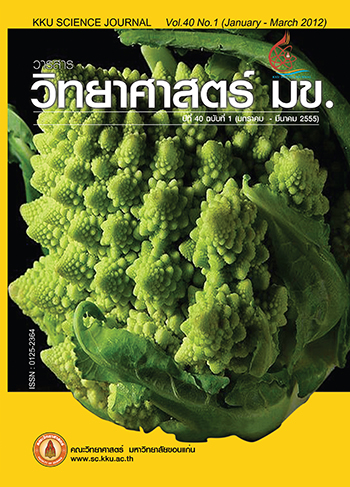Carboxymethyl Cellulase Production by Penicillium oxalicum HS1-3 Isolated from Soil in Chaiyaphum Province
Main Article Content
Abstract
Agricultural cellulosic material is importance for bio-energy production because it is cheap, abundant and virtually inexhaustible source of renewable bioenergy. Cellulolytic enzymes are major group of enzyme that is capable degrading cellulose to glucose. This study aimed on screening of fungi producing carboxymethyl cellulase which was isolated from 48 samples of soil, wood and leaf decay in Chaiyaphum province, the northeastern part of Thailand. Only 25 fungal isolates exhibited carboxymethyl cellulase activity on plate screening assay. The selected 5 fungal isolates (HS1-3, HS1-5, HS1-7, HS1-12, HS2-5) which exhibited high carboxymethyl cellulase on the agar plate were grown and their abilities of enzyme production were determined. The 5 fungal isolates were cultured in mineral salt agar medium at pH 5.0 containing 1.0% carboxymethyl cellulose and incubated at 150 rpm, 30°C for 7 days. The results showed that fungal isolate HS1-3 exhibited the highest enzyme activity (150 U/mL). The identification of fungal isolate HS1-3 was carried out by the internal transcribed spacer region (ITS) DNA sequencing and compared with BLASTN Homology Search. The results indicated that the DNA sequence of fungal isolate HS1-3 was 100 percent (1046/1046 nucleotides) identical with Penicillium oxalicum, GenBank accession number HQ843504.1.
Article Details

This work is licensed under a Creative Commons Attribution-NonCommercial-NoDerivatives 4.0 International License.


